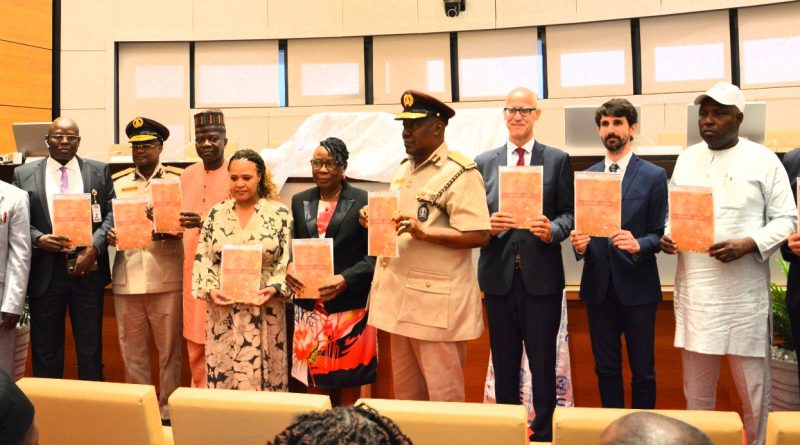FGN, UNODC Launches Observatory on Smuggling of Migrants in Nigeria, as research reveals that 75% of Nigerian migrants planned to use smugglers
…NIS says the Service will continue to effectively collaborate with all critical stakeholders and development partners
ORU Leonard
The Federal Government of Nigeria through the Nigeria Immigration Service, United Nations Office on Drugs and Crime and the Government of Canada has collaborated to Launch of the Observatory on Smuggling of Migrants in Nigeria based on 2021 research; and flag-off of the 2022 Nationwide Sensitasion Program on SOM iñ in Nigeria SOM2022
The event which took place on Tuesday, 13th September 2022 at the Nigerian Immigration, was a research findings on smuggling of Nigerian Migrants funded by the Canadian Government to strengthen Evidence- Based Response to Trafficking in Persons and Smuggling of Migrants in Nigeria.
In his remarks the UNODC Country Representative, Oliver Stolpes said the ultimate objective of the research was to support United Nations member states in preventing and combatting the smuggling of Migrants, promoting international cooperation among states in counter-smuggling operations and promoting the rights of smuggled people.
Commenting further, he said “The field research that informs the Smuggling of Observatory Analysis on Migrant smuggling from Nigeria commenced in 2019 and ran through 2021 and was undertaken in three phases. The first phase covered Edo, Imo, Kano and Lagos States; the second phase focussed on Adamawa, Cross River, Delta, Edo, Enugu, FCT, Kano and Osun States; and the third phase which focussed more on the transnational aspect of the phenomenal, looked at the development in Burkina Faso, Libya, Mali, Niger Republic and Tunisia.
Nigerians use migrant smugglers even within West Africa, he pointed out that Nigerians use smugglers at higher rate than other West Africans for travel by land within West Africa and North Africa; adding also that the launch of the Observatory, provided an opportunity to engage jointly with the UNODC partners in the analysis of trends, with a view to becoming more proactive in identifying and responding to new developments, adjusting their response and becoming more effective in raising awareness among potentially smuggled persons.
Speaking, the Migration Programme Manager of the Canadian High Commission in Nigeria, Marjorie Lubin, said strengthening evidence-based response to trafficking in persons and smuggling of Migrants in Nigeria is a project which started in 2020 and was borne out of recommendation that there was a lack of reliable data essential for evidence-based decision and policy making.
She stated that the team worked on equipping stakeholders and partner agencies with the tools to identify, analyse and document findings; and also worked on conducting targeted and effective investigations, how to successfully prosecute cases, informing the population and deterring people from being further victimized.
Earlier, the Comptroller General of Immigration, Idris Jere who was represented by the Deputy Comptroller General, Visa and Residency, Ishaka Haliru, noted that the Nigeria Immigration Service according to its mandate and responsibility to fight the menace of migrant smuggling, will continue to effectively collaborate with all critical stakeholders and development partners, adding that the event again solidifies the commitment of the service in the fight against SOM.
The research findings also shows that smugglers and other actors perpetrate abuses and crimes against smuggled Nigerian migrants at an alarming rate. Half of smuggled Nigerians surveyed in 2021 reported physical violence, while 25 per cent cited being detained and 20 per cent described sexual violence. Adults reported significant threats to children along these routes as well, including the risk of being trafficked, exploited, kidnapped, or subjected to physical and sexual violence and robbery.
The research shows that 75% of Nigerian migrants planned to use smugglers or travel facilitators for overland journeys. Requests for bribes and security risks along routes taken by migrants from Nigeria have led to a high reliance on smugglers and travel facilitators (who organize regular travel), new research from the United Nations Office on Drugs and Crime (UNODC) reveals. The research, from the UNODC Observatory on Smuggling of Migrants, notes that some Nigerians surveyed (30 per cent) believed there was no alternative to being smuggled in order to achieve their migration goals.
As one man from Edo State in southern Nigeria described: “These days in Europe and in other Western countries, Nigerians are discriminated against…It is so difficult to get a visa to travel out of Nigeria, and that is why many people opt for the irregular route by travelling through the desert.”Many Nigerians believe that using a smuggler will be cheaper, easier, or safer than undertaking the journey alone, due to the presence of officials or non-state actors demanding bribes and protection money along the route.Even so, surveys indicate that Nigerians pay a high price to the smugglers – an average of around US$610 for smuggling by land within West and North Africa. Fees cover access to the network of smuggling contacts, transportation and sometimes also bribes and accommodation, but usually exclude food and drink.
The lack of food and water can be deadly along some treacherous routes in the desert. In 2021, one returned Nigerian receiving support at a centre in Edo State told a key informant “how they slept and before the next morning almost half of them were buried alive in sand dunes in the desert.”Smugglers and other actors perpetrate abuses and crimes against smuggled Nigerian migrants at an alarming rate. Half of smuggled Nigerians surveyed in 2021 reported physical violence, while 25 per cent cited being detained and 20 per cent described sexual violence. Nigerian female migrants are subjected to sexual abuse as smuggling payment.
Adults reported significant threats to children along these routes as well, including the risk of being trafficked, exploited, kidnapped, or subjected to physical and sexual violence and robbery.
Data and information on the routes, financial aspects, drivers, and impacts of migrant smuggling can equip states to better respond to prevent and combat migrant smuggling and protect the rights of smuggled people. The UNODC Observatory on Smuggling of Migrants is designed to provide such up-to-date evidence.The Observatory regularly updates its analysis to provide real-time information and to allow for longitudinal assessment, and is currently expanding its research into Southeast Asia.
The Observatory regularly updates its analysis to provide real-time information and to allow for longitudinal assessment, and is currently expanding its research into Southeast Asia. UNODC hopes that this research will be used to prevent and combat migrant smuggling, while protecting the rights of people who are smuggled.




